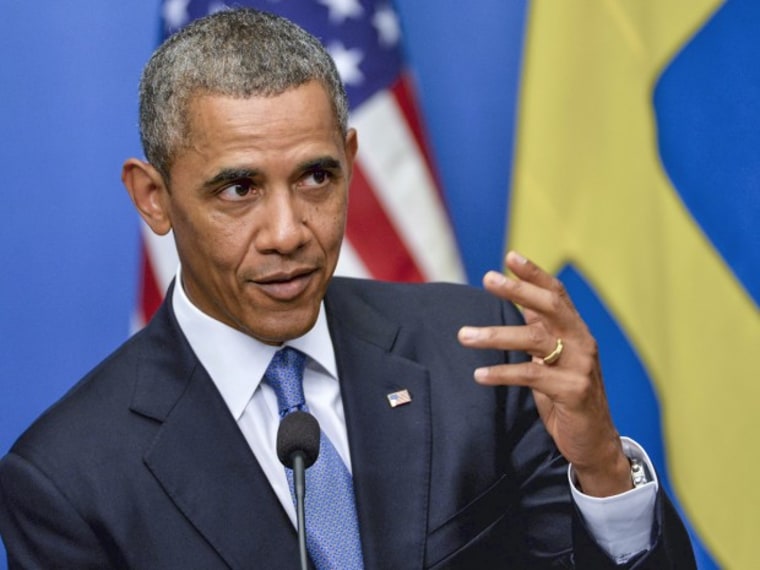President Obama made his international case for intervening in Syria Wednesday, saying at a press conference with Sweden's prime minister that the international community's credibility is on the line if it doesn't hold President Bashar al-Assad responsible for allegedly killing more than 1,400 of his people in a chemical attack last month.
"I think America also recognizes that if the international community fails to maintain certain norms, standards, laws, governing, how countries interact, and how people are treated, that over time this world becomes less safe. It becomes more dangerous not only for those people who are subjected to those kinds of crimes, but to humanity," he said during the joint press conference in Stockholm with Sweden's Prime Minister Fredrik Reinfeldt.
Congress' approval to strike would send a strong message in favor of prohibition against using chemical weapons, he said. If action isn't taken, he said, then leaders not shamed by resolutions will "continue to act by impunity, and those international norms begin to erode."
"My credibility isn't on the line. The international community's credibility is on the line, and America's and Congress' credibility is on the line," he said.
Obama stopped off in Stockholm on his way to St. Petersburg for the G-20 summit. Russian President Vladimir Putin, who has close ties with Assad, has warned the West on taking action against Syria and said over the weekend that it did "not follow logic" to strike against the country. Wednesday, Putin said Russia "doesn't exclude" a U.N. resolution to take a military strike against Syria if investigators turn up evidence that the Assad regime used chemical weapons against civilians.
"We have our ideas about what we will do and how we will do it in case the situation develops toward the use of force or otherwise," Putin told the Associated Press during an interview Wednesday.
"It has been difficult to get Russia working through the Security Council to acknowledge some of the terrible behavior of the Assad regime and push toward the political transition needed to stabilize Syria," Obama said, adding that he will continue to engage Putin in a resolution amid escalating tensions between the two countries.
The Syrian president, who hasn’t denied that chemical weapons were used last month, threatened "negative repercussions" if the United States launches an attack against his country.
"We believe with high confidence that chemical weapons were used and that Mr. Assad was the source," Obama said during the press conference.
The remaining dispute is who used the weapons, which is outside the parameters of the investigation by the United Nations. But the Syrian opposition doesn't have the capability to deliver weapons of that scale, Obama said.
What the administration has deemed as Assad's use of chemical weapons against his people is a violation of Obama's previously designated "red line" for prompting unspecified U.S. action.
"I didn't set a red line, the world set a red line," he said Wednesday. "When I said my calculus about what's happening in Syria would be altered by the use of chemical weapons, which the overwhelming consensus of humanity says is wrong, that wasn't something I just kind of made up. I didn't pluck it out of thin air. There's a reason for it."
Blood and hair samples taken from East Damascus by first responders tested positive for signs of sarin, a highly toxic, man-made chemical nerve agent that can be used as both a liquid and a gas, U.S. Sec. of State John Kerry said Sunday.
The Obama administration briefed lawmakers during Labor Day weekend to rally support for military intervention in Syria. The Senate Foreign Relations Committee drafted a new bipartisan resolution Tuesday night for a limited strike on Syria. The Senate panel could vote on the draft as early as Wednesday.
"After we've gone through all this, are we going to try to find a reason not to act?" Obama said. “If that's the case, then I think the world community should admit it because you can always find a reason not to act.”
